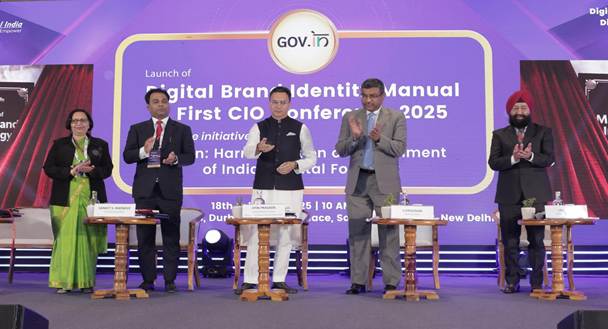DBIM is to harmonizes government’s Digital presence

FinTech BizNews Service
Mumbai, February 19, 2025: The Ministry of Electronics and Information Technology (MeitY) yesterday marked a significant step in India's digital governance with the launch of the Digital Brand Identity Manual (DBIM) and the inaugural Chief Information Officer (CIO) Conference 2025. Held in New Delhi, the event was presided over by Shri Jitin Prasada, Union Minister of State for Electronics and Information Technology and Commerce & Industry and Shri S. Krishnan Secretary for Minister of Information Electronics Technology, under the Gov.In: Harmonisation of Government of India's Digital Footprint initiative.
Standardized and cohesive digital presence across platforms
During launch Shri Jitin Prasada emphasized that the Digital Brand Identity Manual (DBIM) will enhance the government's "Minimum Government, Maximum Governance" approach by introducing "Uniform Governance," ensuring a standardized and cohesive digital presence across all ministries and platforms.
He also highlighted that DBIM aligns with the Prime Minister’s vision of "Reform, Perform, and Transform", making India’s digital governance more accessible, inclusive, and citizen-centric, thereby strengthening the country’s e-governance ecosystem on a global scale. The initiative focuses on simplifying and standardizing government websites, ensuring that citizens from diverse backgrounds can easily navigate and access essential government services.
In addition to above, he stressed the role of the Central Content Publishing System (CCPS) in making key government policies, schemes, and initiatives readily available, improving transparency and public engagement. He also emphasized the importance of innovation, agility and security in digital governance, leveraging AI-driven tools and robust security measures to build a seamless, trustworthy and future-ready digital ecosystem, contributing to India’s vision of Viksit Bharat 2047.
Govt unveils DBIM for efficiency
MeitY Secretary, S. Krishnan highlighted the Prime Minister’s directive to establish a common interface across government websites, ensuring a user-friendly and standardized digital experience. He emphasized a user-centric approach, where government portals must offer accessibility and efficiency comparable to private sector websites across both desktop and mobile devices. A unified digital branding manual (DBIM) has been introduced to enhance service delivery, and centralized content pushing will ensure consistent messaging across ministries, making government priorities more transparent.
He also stressed the critical role of NIC in providing technological support and modernizing government infrastructure to meet evolving digital demands. With the digital economy set to reach 20% of GDP, the Secretary urged ministries to adopt digital tools for better service delivery.
Features of DBIM initiative
The DBIM launch was accompanied by the introduction of several critical components to harmonize India’s digital presence:
The launch also featured the unveiling of the DBIM-compliant MeitY website, demonstrating a consistent and citizen-friendly digital experience. Additionally, four other ministry/department websites have migrated to the Gov.In CMS platform, with more set to follow.
First CIO conference 2025: key discussions
The First Chief Information Officer (CIO) Conference 2025 convened experts from MeitY, NIC, MyGov and various ministries to discuss the adoption and implementation of DBIM. Key discussions revolved around:
The nationwide adoption of DBIM is set to revolutionize citizen engagement, strengthen trust, and enhance government service delivery in the digital space.
Visit the newly launched DBIM-compliant MeitY website for information: https://www.meity.gov.in/
Digital Brand Identity Manual (DBIM)
As part of the Gov.In: Harmonisation of Government of India's Digital Footprint initiative, the DBIM seeks to establish a standardized and seamless digital presence across government ministries, departments, and agencies. This initiative aligns with the vision of Prime Minister Narendra Modi to transform governance through technology, ensuring accessibility, efficiency, and a more citizen-friendly digital experience.
The primary objective of the DBIM is to create a unified and consistent digital brand for the Government of India. By standardizing elements such as color palettes, typography, and iconography, the manual not only ensures uniformity in look and feel but also strengthens the integrity of government-hosted data. This cohesive approach will enable government departments to present a compelling and trustworthy brand presence, both nationally and globally. The guidelines extend beyond websites to cover mobile applications and social media platforms, reinforcing a seamless user experience across all digital touchpoints.The